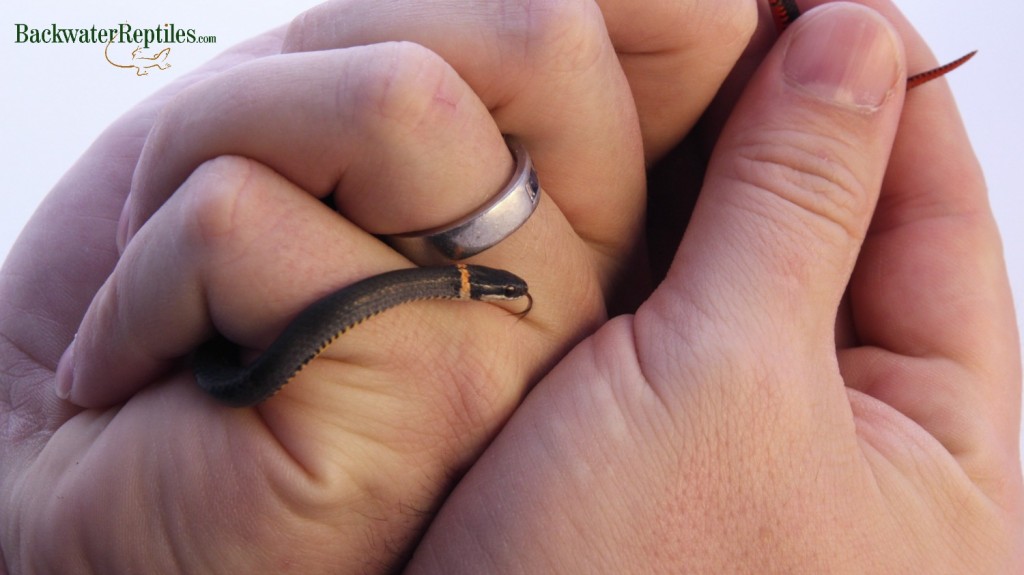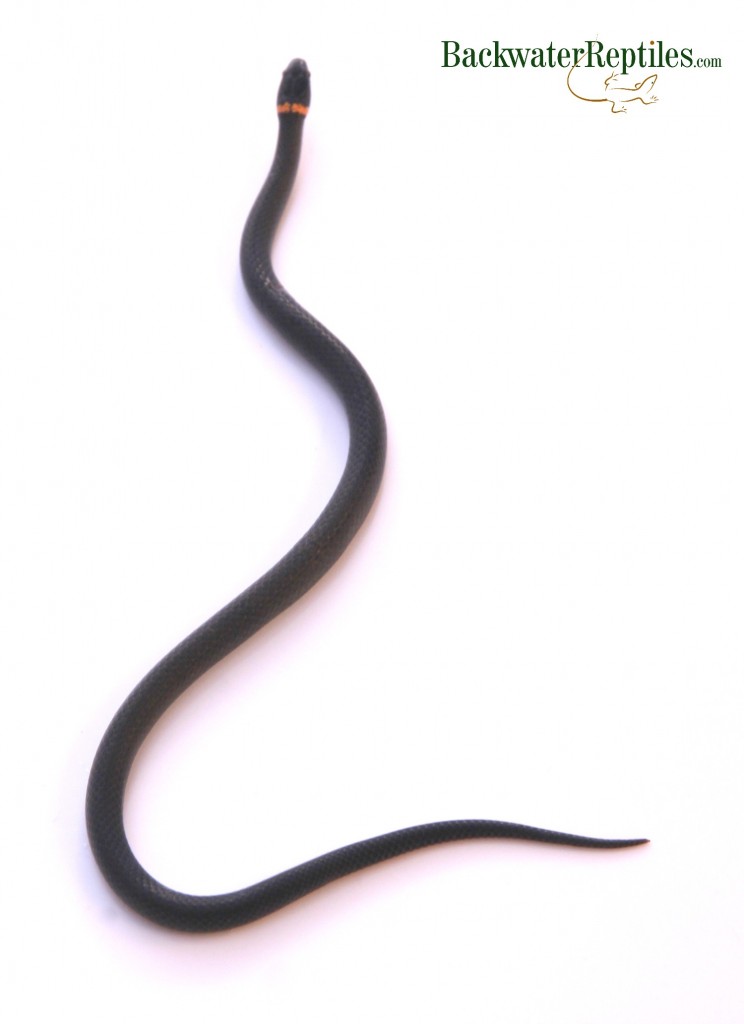Are you considering a new snake, but would like to know what species would make the best small pet snake? Probably the smallest pet snake sold by Backwater Reptiles is the Ringneck Snake (Diadphis sp.), with the Worm snake another contender.
This snake is perfect for someone who definitely wants a small pet snake and doesn’t want to deal with having a large tank or enclosure in their home. They’re great compact little pets and can be kept in a home as small as a shoe box quite happily.
Maybe you’re someone who is attracted to the cuteness of small animals or baby animals. Although the Ringneck Snake won’t be a baby forever, it can certainly pass for a baby snake!
Ringnecks won’t get longer than 15 inches and usually won’t surpass the diameter of a pencil in thickness of body. This means that a full-grown Ringneck Snake is the size most “normal-sized” pet snakes start off as when they’re hatchlings. Now that’s a small snake!

Ringnecks are a dark brown, black, or grey base color with a bright orange or yellow ring around their neck, which explains the origin of their common name. It’s almost like these little snakes wear orange necklaces. The bellies of Ringnecks are yellow or orange to match their neck band. Depending on the specific region the snake is from, the belly might also have black speckles or bars.
The Ringneck Snake has a very widespread distribution in the wild. They can be found throughout most of the United States and even into Southern Canada. They can acclimate to many types of habitats but seem to prefer wooded areas with plenty of hiding places like rocks, logs, and leaf litter. Due to their small size, a good hiding place is an essential survival tool for these little snakes.
Believe it or not, Ringnecks actually have a small amount of venom in their saliva that they utilize when hunting prey. This venom is harmless to people however, so don’t let that frighten you off. Their teeth are also so small that even if you were bitten by your pet Ringneck snake, you probably wouldn’t even feel it! We’ve never even had one attempt to bite, though.

In captivity, Ringnecks are pretty easy to maintain. They like to hide a lot, so they’re not the most entertaining or energetic pet, but they can still be rewarding to care for.
Although we always recommend replicating natural environments through substrate, hiding spaces, and other cage accessories and methods, Ringnecks can actually thrive with a very minimal cage set up. As previously mentioned, they need not have a large living space – a plastic shoe box will do just fine. This is great news for people who live in small spaces and have minimal room to store a tank or vivarium.
You can use paper towels as a substrate or go with something more traditional like peat moss and soil. Just be aware that no matter what you line the enclosure with, your pet Ringneck will more than likely burrow underneath it.
This is why we don’t advise that lots of heavy accessories be kept inside the enclosure with the snake. You don’t want the snake to accidentally dislodge a heavy fake plant or unnecessarily large water dish and injure itself.
Obviously these snakes are too small to consume the standard snake fare of frozen/thawed pinkies, fuzzies, and other rodents. This is good news for the squeamish who don’t want to have to feed their pet snake rodents! Well then, you might be wondering – what do you feed such a tiny carnivore?
At Backwater Reptiles, we have had success feeding our Ringneck Snakes nightcrawlers. In the wild, they eat lots of small invertebrates and sometimes even vertebrates that will fit in their mouth, so you can also try to feed your Ringneck crickets and other appropriately-sized insects, although earthworms are the tried and true food that we recommend.

The best small pet snake – Conclusion
Ringnecks are fairly secretive snakes and can be a bit squirmy when held, but this behavior can be mitigated with frequent handling. Like any snake, your pet Ringneck will never be domesticated, but you can usually safely get it acclimated and used to being taken out of its cage.
While boas and pythons can make wonderful pet snakes, some people prefer a species much more manageable in size, which is why we endeavored to write an article about the best small pet snake, which in our opinion is the Ringneck.
If you think you’re ready to spring for a small pet snake of your own, Backwater Reptiles has Ringneck Snakes for sale.
